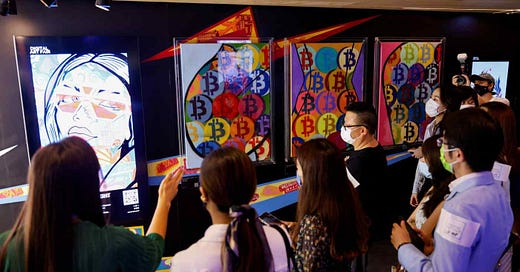You have heard perhaps of the dominance of the Chinese digital Yuan, the world’s leading CBDC. A central bank digital currency is a digital currency issued by a central bank, rather than by a commercial bank.
But have you heard of their state-backed NFT platform?
China to create own NFT industry based on state-backed blockchain infrastructure, main developer says
Could the Chinese State want to control the NFT platform of China? It sounds oddly utopian.
The BSN-Distributed Digital Certificate does not support crypto-transacted NFTs, and will allow businesses and individuals to build apps and portals to manage tokens.
The new infrastructure has the potential to disrupt the current industry, having already attracted more than 20 partners.
What is China’s BSN?
The BSN is a blockchain development platform made available through cloud-based nodes in cities in China and abroad.
China’s state-backed Blockchain Services Network (BSN) plans to roll out infrastructure at the end of this month to support the deployment of non-fungible tokens (NFTs), a major step to creating a Chinese NFT industry that is not linked to cryptocurrencies.
Crypto is banned in China, but in theory NFTs could thrive. Here’s why:
The infrastructure, named the BSN-Distributed Digital Certificate (BSN-DDC), to differentiate it from crypto-transacted NFTs, will offer application programming interfaces for businesses or individuals so they can build their own user portals or apps to manage NFTs. Only Chinese yuan is allowed for purchases and service fees.
Public Blockchain are Illegal in China
NFTs are launched and traded on public blockchains, which are decentralised platforms that provide access to anyone wanting to write and read data. However, public chains “are illegal in China” as the state requires all internet systems to verify user identities and permit the regulator to intervene in the event of “illegal activities”.
BSN, Red Date’s NFT project’s underlying platform backed by state-owned China Mobile, China UnionPay and State Information Centre, has already “localised” more than 20 public chains since its 2018 debut. Thus NFTs can live and thrive in New China, a place where the Digital Yuan rules, and Crypto is illegal.
BSN-DDC will integrate 10 chains, including the adapted version of Ethereum and Corda, plus domestic ones like Fisco Bcos, initiated by Tencent-backed fintech firm WeBank.
In China, NFTs are called “Digital Collectibles” for compliance reasons.
Ant Group and Alibaba Group appear to be among the first in China to embrace NFTs, launching dozens of products since last summer.
The future of NFTs in China is by no means certain. Some also interpret this news as China planning to separate the infrastructure used for crypto from the one used to create NFTs so that its crackdown on cryptocurrencies doesn't harm the country's NFT industry. I think that’s not exactly correct but certain China’s approach to blockchain is more regulated.
While the West has more NFT pure-play Platform startups, you could argue China’s BigTech are ahead of the West’s. JD.com and Baidu followed with their own digital collectibles, after Ant Group and Alibaba Group. ByteDance and others are also in the mix.
In a world where the Digital Yuan is a fast growing app, I think it’s safe to surmise that the BSN-DDC infrastructure has the potential to disrupt the current industry. It has already attracted more than 20 partners, including Cosmos blockchain network, digital receipt system maker Baiwang, and video technology service provider Sumavision.
I personally simply equate the BSN with the Chinese Government. China’s regulatory bodies are getting more power as it regulates everything in a more strict and exacting manner.
In China today NFTs are often used for digital art works. However blockchain in China and even BSN could be implicated in certificate management, such as car license plates and school diplomas as it is a “revolutionary database technology” that can differentiate different parties’ access to the data.
China’s dominance of its CBDC will also be interesting to watch. China is ramping up efforts to roll out the digital yuan to the broader population, as the country’s technology giants like Alibaba and Tencent jump on board.
One of the fastest-growing apps in China right now, by installs, is the central bank's digital yuan wallet: 261 million individual users (as opposed to enterprises), about one-fifth of the population, have set up e-CNY wallets so far, as of January 18th, 2022.




